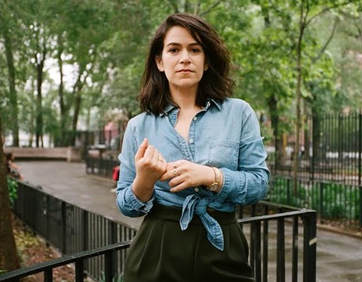 I’m currently in the middle of Abbi Jacobson’s book, I Might Regret This, and like the television show she co-created, Broad City, it’s quirky and hilarious. But it’s also a lot more meditative and heartfelt than the stoner buddy comedy she writes, produces, and stars in. I got to see her on her book tour a few months ago, and she read aloud a short chapter titled, “All the Incredible Things I Did Not Do” that really captured the self-reflective spirit of the book. When you tell people you are going somewhere […], you will likely be inundated with all the things you must do, have to see, cannot miss. […] [E]very single person had an opinion, to the point where they all canceled each other out. I felt pressure, as if the drive would be a complete waste of time if I didn’t cross all those things off my list and report back about my findings. It was too much. […] I just wanted to be, without the stress of a to-do list. So, I threw it out. […] Maybe that means I missed out on the most coveted places those cities and destinations have to offer, but I found my own way. […] It was a mess and not perfect and all mine. […] It’s okay to not see all the art and not meet all the locals and not walk all the famous walks or hear all the indie bands in the coolest venues in town. […] It’s okay to not figure it all out. It’s okay to feel broken and alone and scared sometimes. It’s okay to not know everything. […] It’s okay if it’s not all amazing or incredible or spectacular. […] It’s okay to think it’s not okay. […] This went exactly how I needed it to. I guess it usually does. While Jacobson’s essay collection was inspired by her heartbreak and subsequent road trip, I saw a lot of overlap with the ideas I like to poke at every week on this blog, namely the FOMO (fear of missing out) that pervades all of our lives nowadays. As Jacobson prepared for her road trip, she felt pressure to maximize every moment of every drive and every pit stop and every sojourn on her three-week adventure. But that would be impossible. You’re always going to miss something great, or have a mediocre meal that could’ve been phenomenal, or opt to go to bed early when you could’ve stayed out all night with strangers who would become your best friends. In the same way, going down one career path means leaving other careers behind. I can remember realizing in high school that my opportunity to be an Olympic figure skater had passed. This was always a somewhat unlikely ambition as I’d only ever gone ice skating half a dozen times, but it’s the first moment when I can remember feeling like a door had been closed to me. And as we get older, we close more and more doors. Walking down one side of the fork means we can’t walk down the other. It doesn’t mean we can’t go back or change our minds or wait until we’re older to try something different, but, realistically, we have to say no to a lot more things than we get to say yes to. As this year winds down, I’m thinking about my own path and the experiences that have led me to this moment. I feel far more delight than disappointment as I reflect on the things I have pursued and the things I have let go of. And I feel a lot of excitement about the opportunities yet to come next year and farther down the line. But the thing I’m trying to hold onto the most is Jacobson’s declaration that everything is okay: delight and disappointment, excitement and apathy, where you were before and where you are now. All of it is exactly what it’s supposed to be. It usually is.
0 Comments
Leave a Reply. |
What is the When I Was 17 Project?When I Was 17 is a blog series dedicated to collecting the varied stories of people's career paths, what they envisioned themselves doing when they were teenagers and how that evolved over the course of their lives. I started this project with the goal of illustrating that it's okay not to know exactly what you want to do when you're 17; many successful people didn't, and these are a few of their stories.
Archives
October 2020
|